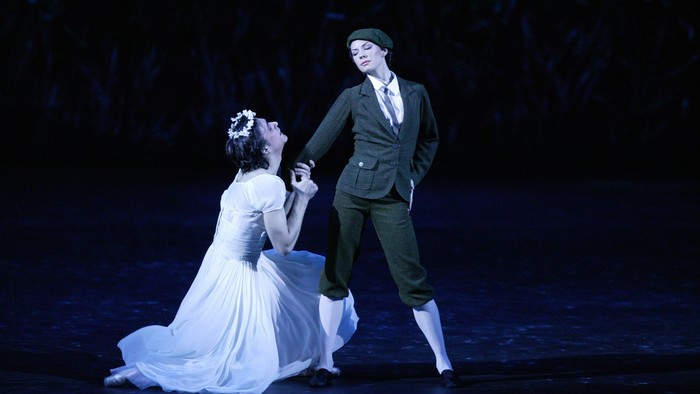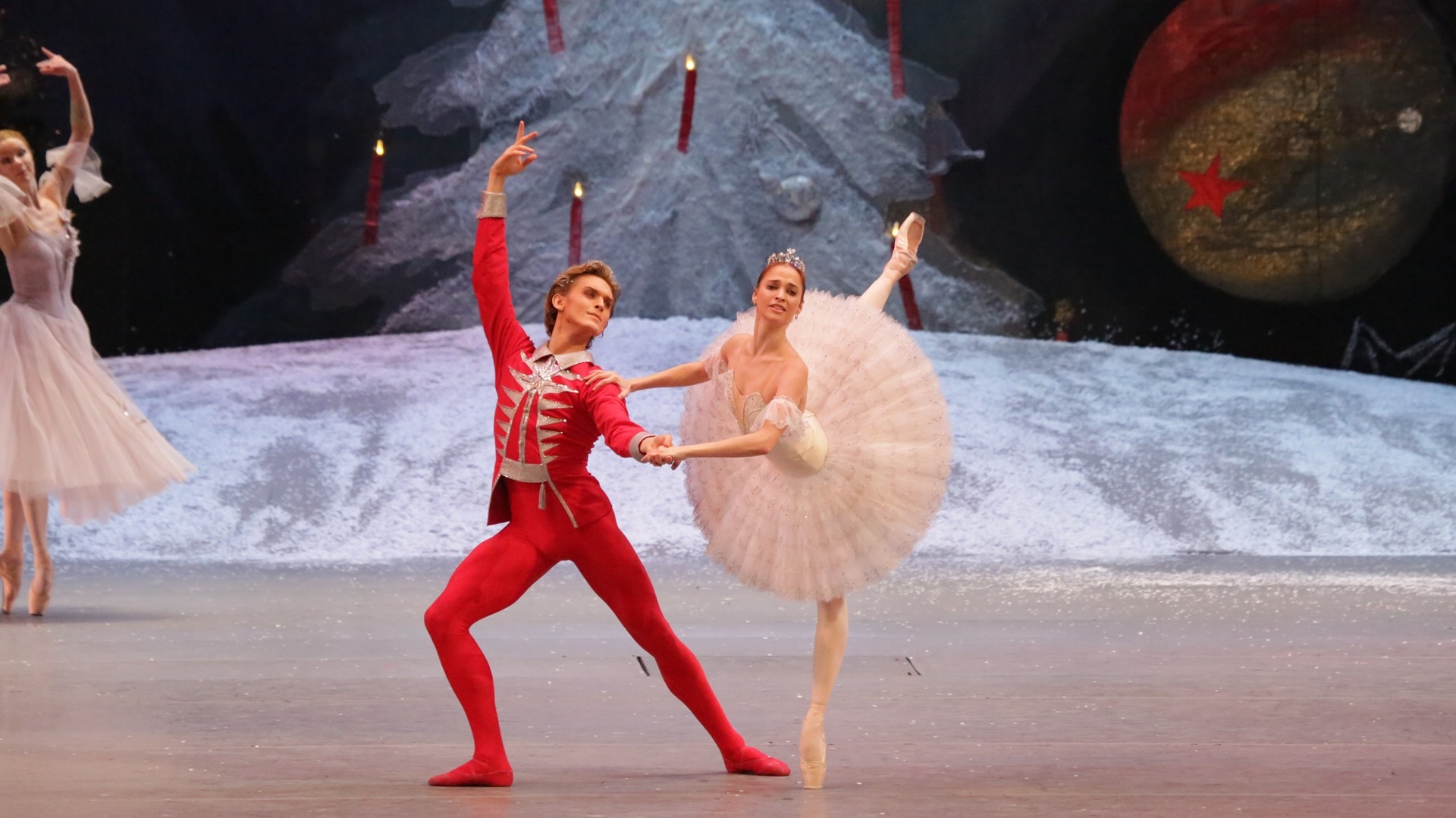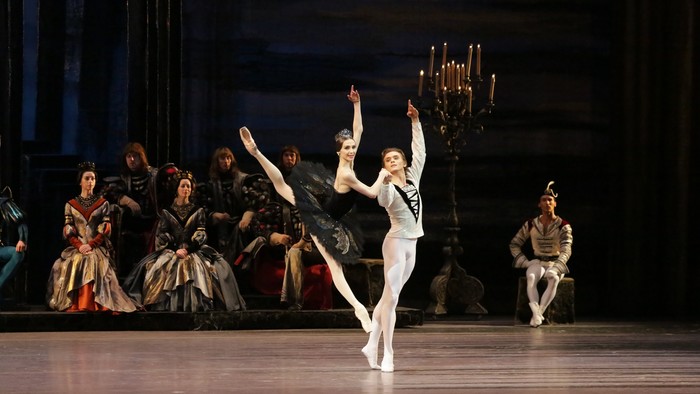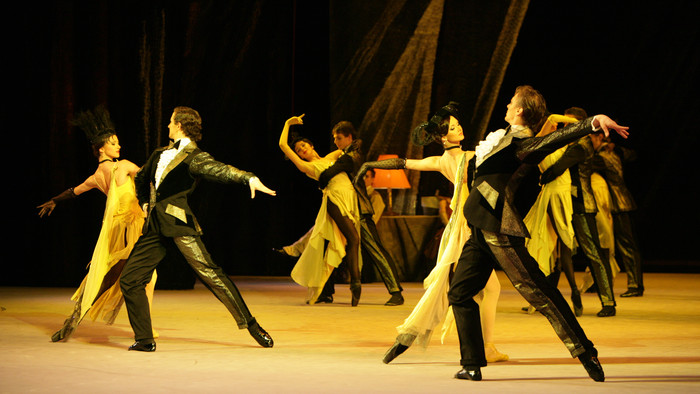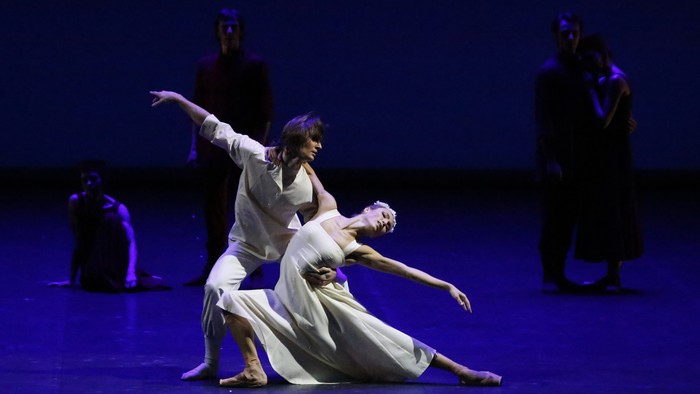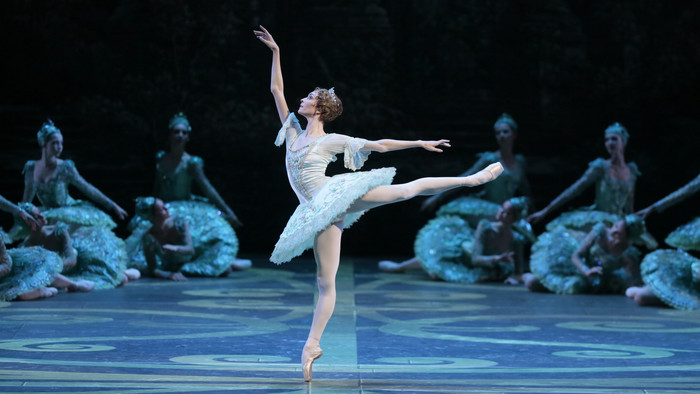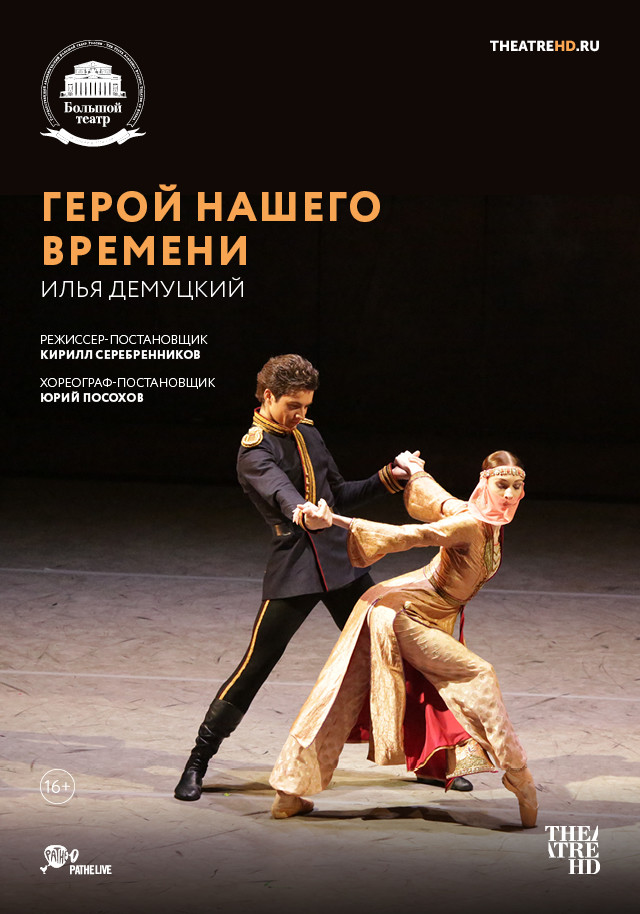
A Hero of Our Time
Герой нашего времени
With participation of Russian National Wheelchair Dance Sport team memebers (RNWDS)
“Where there is poetry there is ballet”
The new ballet score, based on motifs from the Lermontov novel A Hero of Our Time, was commissioned from the very young (32-year-old) Petersburg composer Ilya Demutsky who, though not averse to experiments, keeps to a fairly traditional musical language. However his acute interest in contemporary topics which finds reflection in his music, and his outlook immediately indicated that the ballet version of Lermontov’s Pechorin would in no way be a younger brother to the ‘Byronic’ Conrad in Le Corsaire.
Actors
Печорин (часть БЭЛА)
Печорин (часть ТАМАНЬ)
Печорин (часть КНЯЖНА МЕРИ)
Бэла
Казбич
Ундина
Старуха / Янко
Слепой мальчик
Княжна Мери
Вера
Грушницкий
Crew
Conductor
Anton Grishanin
Choreographer
Yurij Posokhov
The new ballet score, based on motifs from the Lermontov novel A Hero of Our Time, was commissioned from the very young (32-year-old) Petersburg composer Ilya Demutsky who, though not averse to experiments, keeps to a fairly traditional musical language. However his acute interest in contemporary topics which finds reflection in his music, and his outlook immediately indicated that the ballet version of Lermontov’s Pechorin would in no way be a younger brother to the ‘Byronic’ Conrad in Le Corsaire.
It was the Bolshoi’s artistic director of ballet, Sergei Filin, who suggested choreographer Possokhov and director Serebrennikov should work together on a new ballet. “Have a think about subject matter”, he said to Kirill Serebrennikov. “A Hero of Our Time”, the latter answered straight off.
A Hero of Our Time is one of Serebrennikov’s favorite books. But however much one might love a book, not everyone is capable of bringing it alive in ballet. “I find it surprising no one thought of doing it before”, says Serebrennikov, “it is a quintessentially poetical and inwardly musical work. And where there is poetry there is ballet.”
Three of the five novellas which make up the novel, have been chosen for the ballet — Bela, Taman, Princess Mary. And in each one of these three parts in the ballet, Pechorin is quite different. He is changed by circumstance, age, the way in which he is presented — in Bela he is seen through the eyes of another character, while in Taman and Princess Mary, he “speaks” for himself, via the chapters of his diary. In all these different guises, there can be no question of Pechorin being an integrated character. " If I tell you about someone, you will have an image of this man in your mind, but if I read this man’s diary, I will get an impression of a quite different person, and in real life there will be a third person" (Serebrennikov). Each Pechorin has his own character, as revealed in his opening monologue, his own musical characterization, as conveyed to the audience by a particular musical instrument, positioned directly on stage.
The Theatre dedicated the production to the 200th anniversary of the birth of Mikhail Lermontov, the great Russian poet, which was celebrated at the end of 2014.
Pechorin’s diary
1.
Prologue
Pechorin alone.
When I saw Bela in my own house; when, for the first time, I held her on my knee and kissed her black locks, I, fool that I was, thought that she was an angel sent to me by sympathetic fate... Again I was mistaken; the love of a savage is little better than that of your lady of quality, the barbaric ignorance and simplicity of the one weary you as much as the coquetry of the other. I am not saying that I do not love her still; I am grateful to her for a few fairly sweet moments; I would give my life for her — only I am bored with her... Whether I am a fool or a villain I know not; but this is certain, I am also most deserving of pity — perhaps more than she...
Bela’s funerals.
Muezzin’s exequial cant and a voice of a Russian wailer are heard.
How tiresome... I went away to order a coffin. Should I have erected a cross? No, a cross would not have done!..
...After all, she was not a Christian.
2.
Celebration.
Mountaneers, Pechorin, Kazbich.
Bela appears.
‘What was it she sang — do you remember?’
‘It went like this, I fancy: ’Handsome, they say, are our young horsemen, and the tunics they wear are garnished with silver; but handsomer still is the young Russian officer, and the lace on his tunic is wrought of gold. Like a poplar amongst them he stands, but in gardens of ours such trees will grow not nor bloom!’
‘Well, now, what do you think of her?’
‘Charming! What is her name?’
‘Her name is Bela.’
‘Bela.’
‘It is a bad thing to interfere in other people’s quarrels. Wouldn’t it be better for us to clear off without loss of time?’
‘Wait, though, and see how it will end!’
‘Oh, as to that, it will be sure enough to end badly; it is always so with these Asiatics. Once let them get drunk on buza, and there’s certain to be bloodshed.’
Pechorin abducts Bela.
3.
Bela at Pechorin’s.
She sits in the corner, muffled in her veil, and neither speaks nor looks up — timid as a wild chamois! I have hired the wife of our dukhan-keeper: she will look after Bela and accustom her to the idea that she belongs to me — for she shall belong to no one else!
No one!
Pechorin seduces Bela.
‘Listen, my Peri, surely you know that you will have to be mine sooner or later — why, then, do you but torture me? Is it that you are in love with some Chechene? If so, I will let you go home at once. Or is it that I am utterly hateful to you? Or that your faith prohibits you from giving me a little of your love? Believe me, Allah is one and the same for all races; and, if he permits me to love you, why, then, should he prohibit you from requiting me by returning my love? Listen, my dear, good Bela! You see how I love you. I am ready to give up everything to make you cheerful once more. I want you to be happy, and, if you are going to be sad again, I shall die. Tell me, you will be more cheerful?’
Pechorin returns. He has lost interest in his abductee.
Bela’s heart is broken.
4.
Mountaneers. Kazbich. Bela’s death.
‘I don’t want to die!.. It burns...’
‘Where?’
‘Here in my breast... Piercing... As a red-hot blade... Water, water!..
‘Where is father?! Grisha... I want back to the mountains, back home...
‘Grishaaa... Why don’t you love your janechka anymore?.. Is it because I am not a Christian? How terrible, Grisha... how terrible... our souls will not meet in the other world... in Paradise another woman will be your companion...’
‘Do you want to be baptized?’
‘No... I will die in the faith in which I was born... It is better now... Go to bed, Grisha... Kiss me, Grisha... I beg of you...’
Pechorin and the dead Bela. He is uncertain whether he should bury her as a Christian or as a Muslim.
The mountains of Caucasus are not moved by human pain.
TAMAN
1.
Pechorin arrives at Taman.
Taman is the nastiest little hole of all the seaports of Russia. I was all but starved there, to say nothing of having a narrow escape of being drowned. I arrived late at night by the post-car... The sentry, a Cossack from the Black Sea, hearing the jingle of the bell, cried out, sleepily, in his barbarous voice, “Who goes there?” An under-officer of Cossacks and a headborough came out. I explained that I was an officer bound for the active-service detachment on Government business, and I proceeded to demand official quarters. The headborough conducted us round the town. Whatever hut we drove up to we found to be occupied. The weather was cold; I had not slept for three nights; I was tired out, and I began to lose my temper.
‘Take me somewhere or other, you scoundrel!’ I cried; ‘to the devil himself, so long as there’s a place to put up at!’
‘There is one other lodging,’ answered the headborough, scratching his head. ‘Only you won’t like it, sir. It is uncanny!’
2.
A mysterious house at the sea shore. The wind is blowing.
Pechorin, the Old Woman, the Blind Boy.
‘You are the master’s son?’
‘No.’
‘Who are you, then?
‘An orphan — a poor boy.’
‘Has the mistress any children?’
‘No, her daughter ran away and crossed the sea with a Tartar.’
‘Not a single icon to be seen on the wall — a bad sign!’
Undine appears.
Pechorin falls in love with the strange beauty.
Certainly never before had I seen a woman like her. She was by no means beautiful; but, as in other matters, I have my own prepossessions on the subject of beauty. There was a good deal of breeding in her... Breeding in women, as in horses, is a great thing...
Breeding is chiefly to be detected in the gait, in the hands and feet; the nose, in particular, is of the greatest significance. In Russia a straight nose is rarer than a small foot.
Undine disappears.
Alone, Pechorin falls asleep.
3.
Pechorin’s dream. March of uncanny creatures.
I confess that I have a violent prejudice against all blind, one-eyed, deaf, dumb, legless, armless, hunchbacked, and such-like people. I have observed that there is always a certain strange connection between a man’s exterior and his soul; as, if when the body loses a limb, the soul also loses some power of feeling.
Undine reappears. Seagulls cry.
Pechorin and Undine’s love duet.
‘Tell me, my beauty, what were you doing on the roof to-day?’
‘I was looking to see from what direction the wind was blowing.’
‘What did you want to know for?’
‘Whence the wind blows comes happiness.’
‘Well? Were you invoking happiness with your song?’
‘Where there is singing there is also happiness.’
‘But what if your song were to bring you sorrow?’
‘Well, what then? Where things won’t be better, they will be worse; and from bad to good again is not far.’
‘And who taught you that song?’
‘Nobody taught me; it comes into my head and I sing; whoever is to hear it, he will hear it, and whoever ought not to hear it, he will not understand it.’
Undune lures Pechorin at sea.
‘To-night, when everyone is asleep, go out to the shore.’
‘Follow me! Let us get into the boat.’
‘What is the meaning of this?’
‘It means, it means that I love you!..’
‘What do you want?..’
Undine tries to drown Pechorin. They struggle.
Pechorin manages to survive.
4.
Pechorin searches for Undine in vain.
Pechorin, the Old Woman, the Blind Boy.
‘How come that you have a daughter?’
‘I am deaf. I don’t hear you.’
‘You don’t have a daughter, do you?’
‘I am deaf as a post.’
‘Now, then, you little blind devil. Tell me, where were you roaming with the bundle last night, eh?’
‘Where did I go? I did not go anywhere... With the bundle?.. What bundle?’
5.
Seashore at night. Smugglers.
Arrival of Yanko, leader of smugglers and Undine’s lover.
Yanko, Undine, the Blind Boy.
‘Yanko, all is lost! He saw us.. He will tell on us...
‘Listen, you blind one... She is coming with me. It is impossible for her to remain here. Tell the old woman that it is time for her to die; she has been here a long time, and the line must be drawn somewhere. As for us, she will never see us any more.’
‘And I?..’
‘What use have I for you?’
‘Come on, Yanko...’
Undine and Yanko get away.
The Blind Boy and Pechorin remain alone.
Thank Heaven an opportunity of getting away presented itself in the morning, and I left Taman. What became of the old woman and the poor blind boy I know not. And, besides, what are the joys and sorrows of mankind to me — me, a travelling officer, and one, moreover, with an order for post-horses on Government business?
PRINCESS MARY
1.
Prologue — Pechorin’s solo
Yesterday I arrived at Pyatigorsk. I have engaged lodgings at the extreme end of the town, the highest part, at the foot of Mount Mashuk: during a storm the clouds will descend on to the roof of my dwelling. This morning at five o’clock, when I opened my window, the room was filled with the fragrance of the flowers growing in the modest little front-garden. Branches of bloom-laden bird-cherry trees peep in at my window, and now and again the breeze bestrews my writing-table with their white petals... Blithe is life in such a land! A feeling akin to rapture is diffused through all my veins. The air is pure and fresh, like the kiss of a child; the sun is bright, the sky is blue — what more could one possibly wish for? What need, in such a place as this, of passions, desires, regrets?..
2.
Watering-place society.
Medical treatment, exercises, water well.
Grushnitski arrives with the wounded soldiers.
Grushnitski and Pechorin meet.
‘You are embittered against the whole human race?’
‘And I have cause to be...’
‘Oh, really?’
Mary’s arrival.
Pechorin understands that Grushnitski is in love with Mary.
I have never known a waist more voluptuous and supple! Her fresh breath touched my face; at times a lock of hair, becoming separated from its companions in the eddy of the waltz, glided over my burning cheek... She was out of breath, her eyes were dulled, her half-open lips were scarcely able to whisper the indispensable: ‘Merci, monsieur.’
Vera’s appearance.
‘Vera!’
’I knew that you were here.’
‘We have not seen each other for a long time.’
‘A long time, and we have both changed in many ways.’
‘Consequently you love me no longer?..’
‘I am married!..’
‘Again? A few years ago, however, that reason also existed, but, nevertheless...’
‘Perhaps you love your second husband?.. Or is he very jealous? What then? He is young, handsome and, I suppose, rich — which is the chief thing — and you are afraid?..’
‘Tell me, do you find it very amusing to torture me? I ought to hate you. Since we have known each other, you have given me naught but suffering...’
‘Perhaps, it is for that very reason that you have loved me; joys are forgotten, but sorrows never...’
Mary helps Grushnitski who has pretended he is wounded in order to attract her attention.
Pechorin mockers Grushnitski, and he becomes furious.
‘Did you see? She is an angel, simply an angel!’
‘Why?’
‘Did you not see, then?’
‘No. I saw her picking up your tumbler. If there had been an attendant there he would have done the same thing — and quicker too, in the hope of receiving a tip. It is quite easy, however, to understand that she pitied you; you made such a terrible grimace when you walked on the wounded foot.’
‘And can it be that seeing her, as you did, at that moment when her soul was shining in her eyes, you were not in the least affected?’
‘No.’
Pechorin and Mary remain alone with each other.
‘I have heard, Princess, that although quite unacquainted with you, I have already had the misfortune to incur your displeasure... that you have considered me insolent. Can that possibly be true?’
‘Would you like to confirm me in that opinion now?’.
‘If I had the audacity to insult you in any way, then allow me to have the still greater audacity to beg your pardon... And, indeed, I should very much like to prove to you that you are mistaken in regard to me...’
Mary falls under Pechorin’s spell.
Grushnitski is jealous.
3.
Gentlemen’s club. Grushnitski complains about Pechorin’s actions. He thinks Pechorin is going to conquer Mary for himself.
A ball commences.
Polonaise. Waltz. Polka.
Pechorin dances with Mary.
‘I did not expect this from you.’
‘What?’
‘You are going to dance the mazurka with her? She admitted it...’
‘Well, what then? It is not a secret, is it?’
‘Of course not... I ought to have expected such a thing from that chit — that flirt... I will have my revenge, though!’
‘You should lay the blame on your cloak, or your epaulettes, but why accuse her? What fault is it of hers that she does not like you any longer?..’
‘But why give me hopes?’
‘Why did you hope? To desire and to strive after something — that I can understand! But who ever hopes?’
‘You have won the wager, but not quite.’
Quarrel between Grushnitski and Pechorin. Grushnitski challenges Pechorin.
4.
Vera’s letter.
Pechorin and Vera.
Vera (soprano):
I am writing to you in the full assurance that we shall never see each other again. A few years ago on parting with you I thought the same...
it has been Heaven’s will to try me a second time...
...I have not been able to endure the trial, my frail heart has again submitted to the well-known voice...
...you will not despise me for that — will you?
will you?
will you?
...We are parting for ever.
...you may be sure
that I shall never
love another
never
upon you
my soul has exhausted
all its treasure,
its tears
its hopes
there is
something peculiar
there is
something proud and mysterious...
in your voice
there is an invincible power
no one
can so constantly wish to be loved
in no one
is wickedness ever so attractive
no one’s
glance promises so much bliss...
bliss...
bliss...
no one
can better make use of his advantages
and no one
can be
so truly unhappy
so truly unhappy
so truly unhappy
as you...
5.
Pechorin and Grushnitski before the duel.
Each is contemplating his own thoughts.
Seconds appear. The duel is prepared.
Pechorin and Grushnitski swap their pistols.
The duel.
‘Grushnitski! There is still time: recant your slander, and I will forgive you everything. You have not succeeded in making a fool of me; my self-esteem is satisfied. Remember — we were once friends...’
‘Fire! I despise myself and I hate you. If you do not kill me I will lie in wait for you some night and cut your throat. There is not room on the earth for both of us...’
Fire.
Grushnitski is killed.
Vera appears.
Vera (soprano):
I almost fainted at the thought that you had to fight a duel to-day... it seemed to me that I should go mad...
...I am sure
that you remain alive
it is impossible
that you should die, and I not with you
it is impossible
that you should die, and I not with you
impossible...
|impossible...
impossible...
6.
Pechorin realizes that he has killed his friend.
Pangs of conscience.
Vera (soprano):
I have been sitting at the window
three hours now,
awaiting your return...
But you are alive, you cannot have died!..
Good-bye, good-bye!..
If I could be sure
that you will always remember me —
I no longer say love
— no,
only remember...
only remember...
only remember...
Mary appears.
Pechorin tells her that he doesn’t love her.
‘Princess, you know that I have been making fun of you?.. You must despise me. Consequently, you cannot love me...’
‘Oh, God!’
Mary is disgraced.
Pechorin, Mary, Vera.
‘You do not love Mary, do you? You will not marry her? Listen, you must offer me that sacrifice. I have lost everything in the world for you...’
7.
Epilogue.
Pechorin. Pechorin. Pechorin.
And now... I often ask myself, as my thoughts wander back to the past: why did I not wish to tread that way, thrown open by destiny, where soft joys and ease of soul were awaiting me?.. No, I could never have become habituated to such a fate! I am like a sailor born and bred on the deck of a pirate brig: his soul has grown accustomed to storms and battles; but, once let him be cast upon the shore, and he chafes, he pines away, however invitingly the shady groves allure, however brightly shines the peaceful sun. The livelong day he paces the sandy shore, hearkens to the monotonous murmur of the onrushing waves, and gazes into the misty distance: lo! yonder, upon the pale line dividing the blue deep from the grey clouds, is there not glancing the longed-for sail, at first like the wing of a seagull, but little by little severing itself from the foam of the billows and, with even course, drawing nigh to the desert harbour?..
Translation by Ekaterina Baburina
Excerpts form A Hero of Our Time by M. Y. Lermontov after the translation by J. H. Wisdom & Marr Murray
Language
English, french
Runtime
2 hours 32 minutes with one intermission
Act 1
68 min
Intermission
14 min
Act 2
98 min
2017
16+
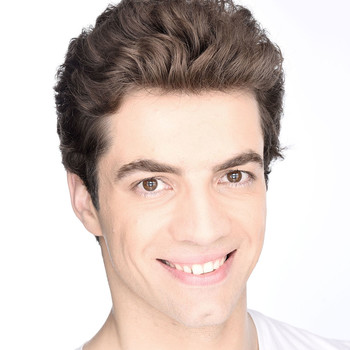


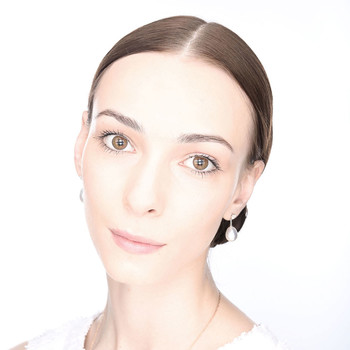





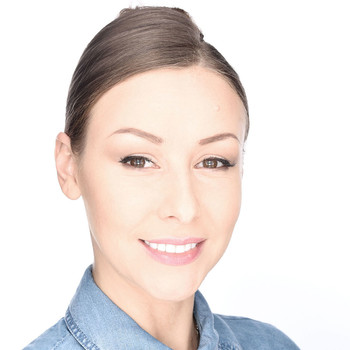



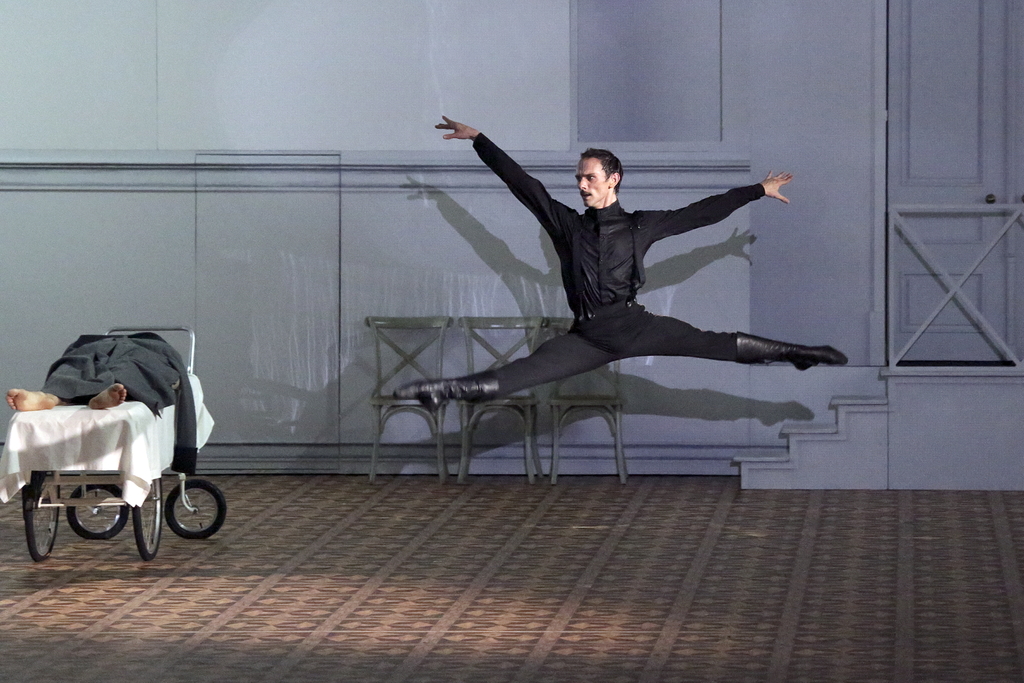
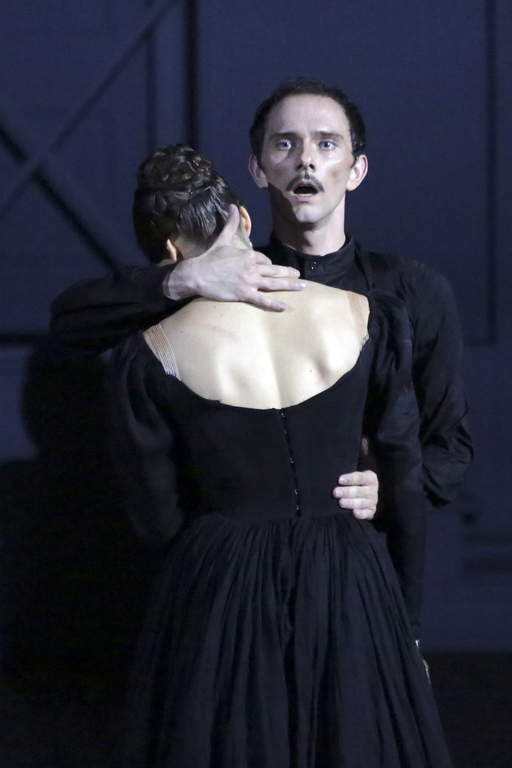

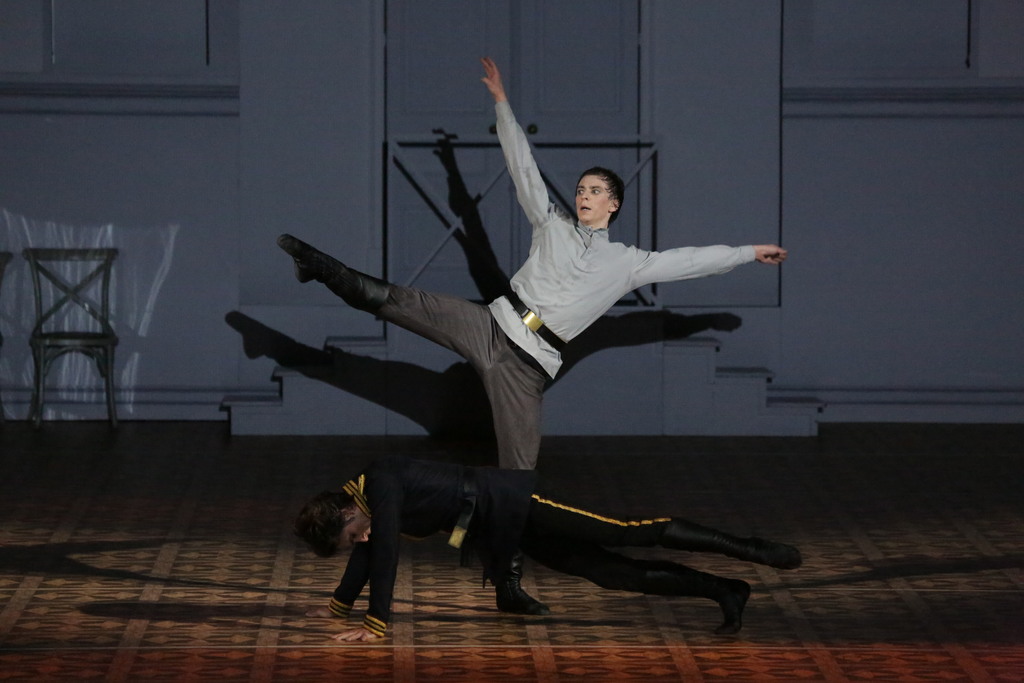
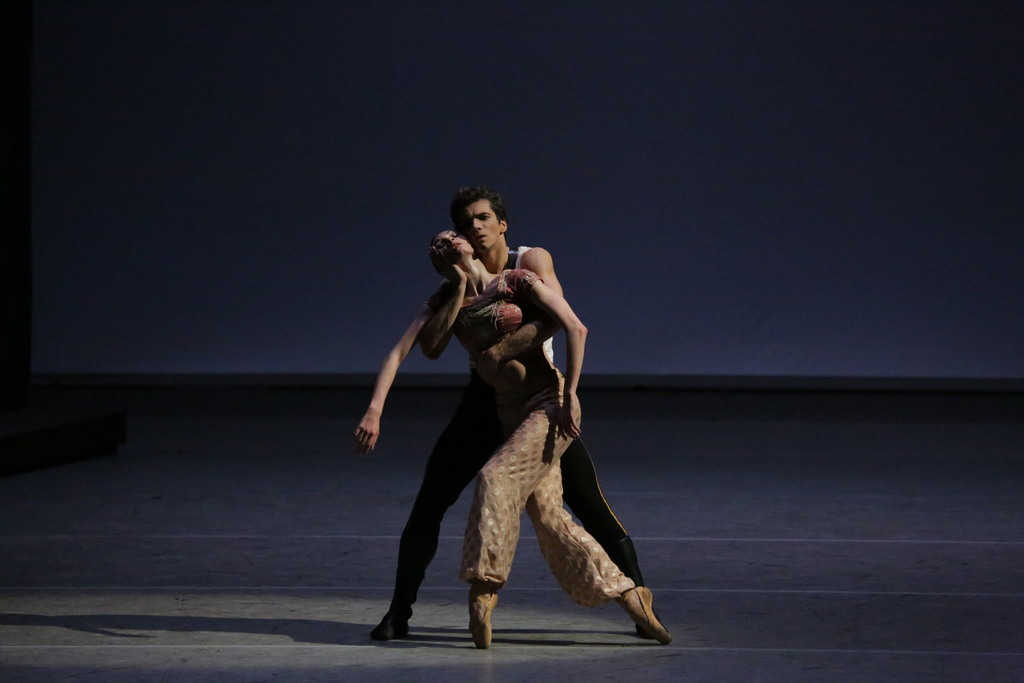
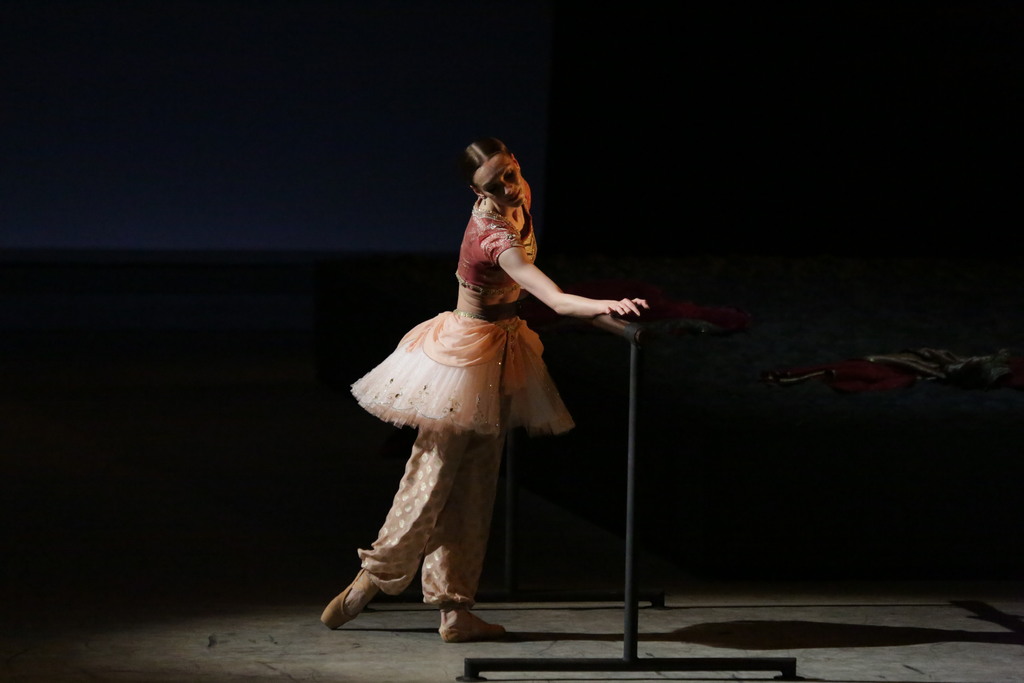
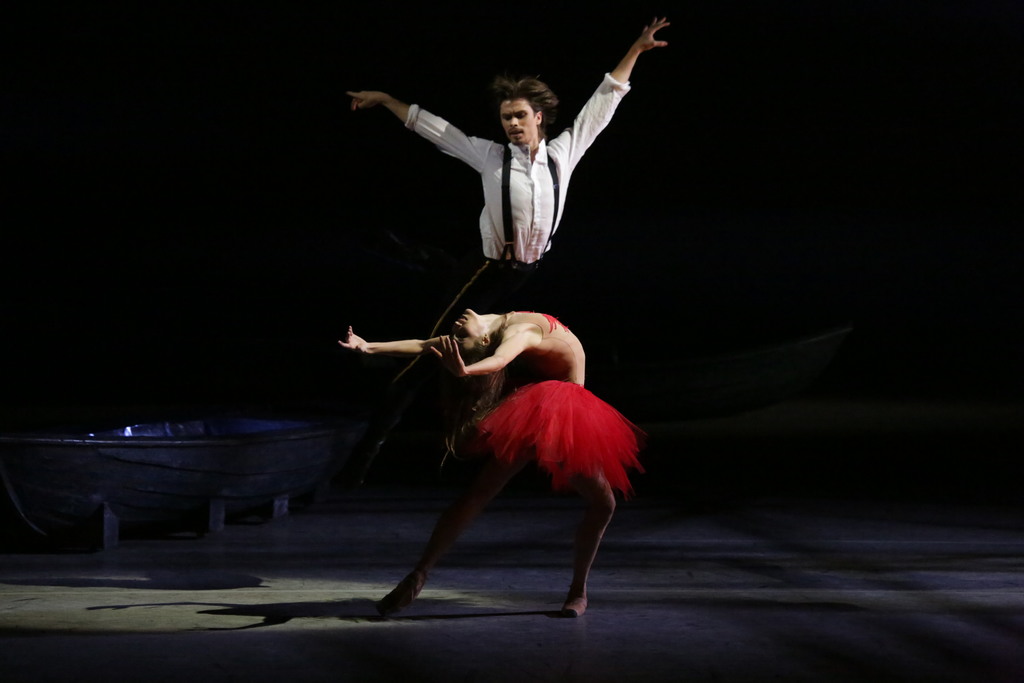
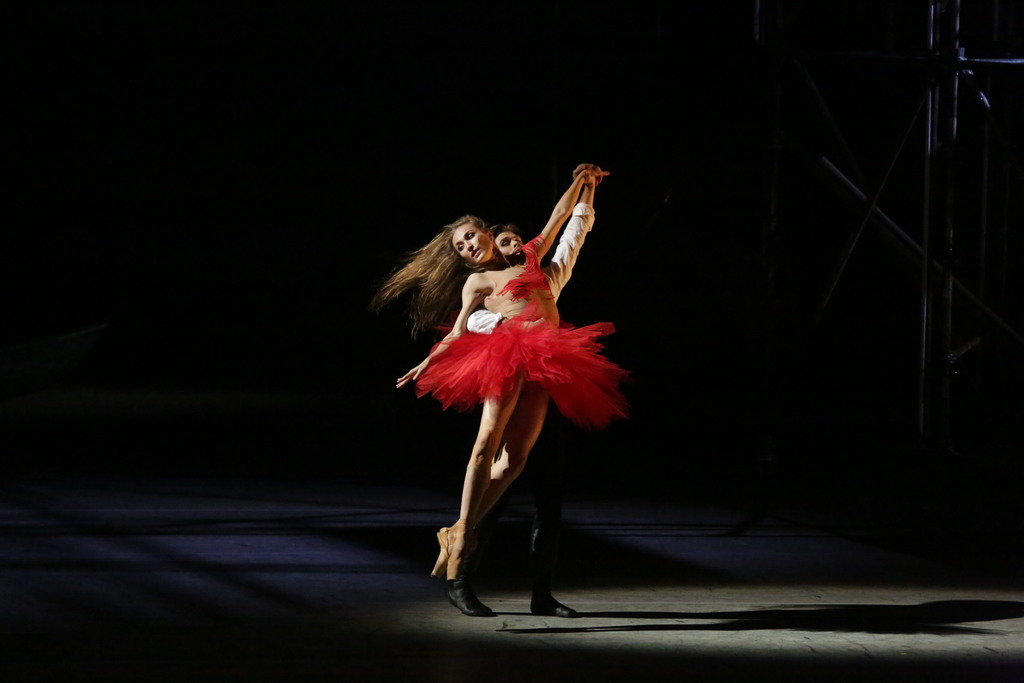
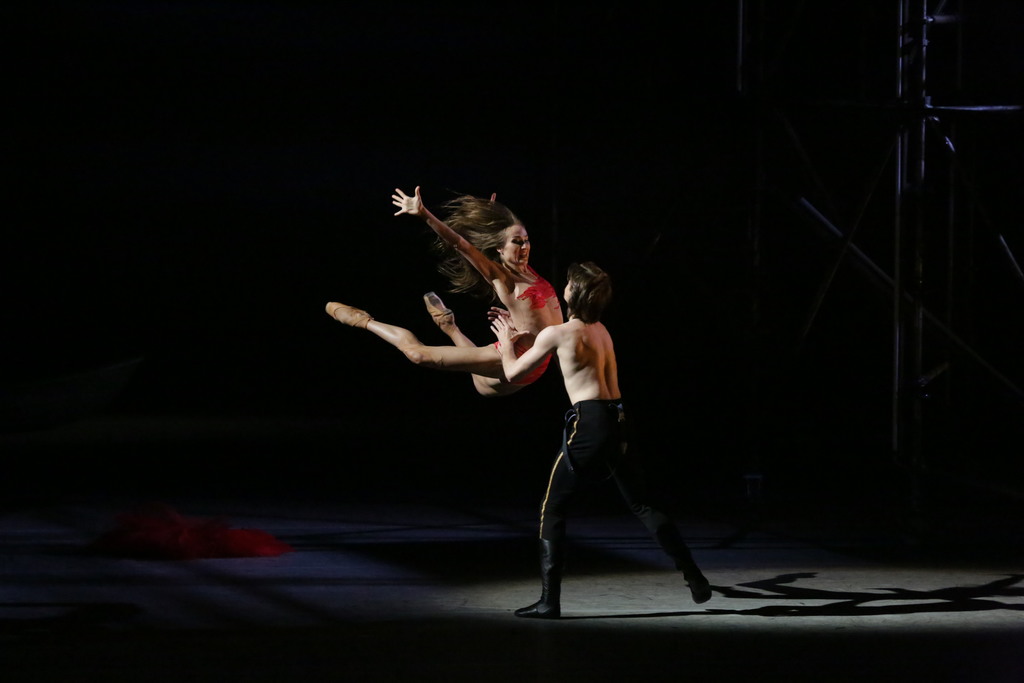
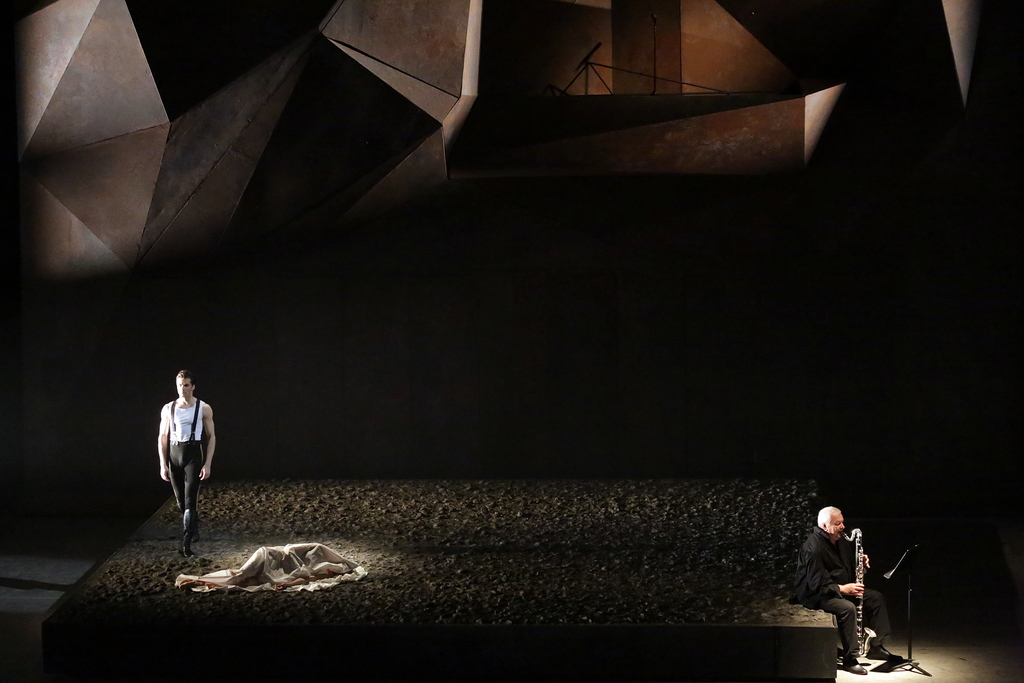
.jpg)

